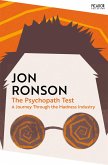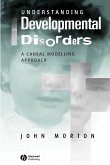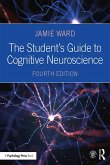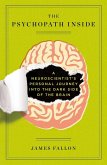This book presents scientific facts of psychopathy and antisocial behavior, addressing critical issues such as the definity of psychopathy, the number of psychopaths in society, whether psychopaths can be treated, and whether psychopathy is due to nurture or to nature.
Psychopaths continue to be demonised by the media and estimates suggest that a disturbing percentage of the population has psychopathic tendencies. This timely and controversial new book summarises what we already know about psychopathy and antisocial behavior and puts forward a new case for its cause - with far-reaching implications.
Hinweis: Dieser Artikel kann nur an eine deutsche Lieferadresse ausgeliefert werden.
Psychopaths continue to be demonised by the media and estimates suggest that a disturbing percentage of the population has psychopathic tendencies. This timely and controversial new book summarises what we already know about psychopathy and antisocial behavior and puts forward a new case for its cause - with far-reaching implications.
Hinweis: Dieser Artikel kann nur an eine deutsche Lieferadresse ausgeliefert werden.
"The psychopath always fascinates, and this new book rises tothe challenge of its subject. The book exhaustively coverseverything known about psychopathy to date. It also brings anexciting new theory, exploring the neuro-biological underpinningsof psychopaths' broken emotions. The Psychopath willbe an engrossing read for any clinician, scientist or student whowants to understand that mysterious individual, the criminalpsychopath." Terrie Moffitt, Institute of Psychiatry,London
"A gem of a contribution to the field of psychopathy, thiswonderful resource provides a highly coherent and integrativereview of developments in cognitive and affective neuroscience andtheir implications for understanding the nature of psychopathy. Theauthors are passionate about their research and this book presentstheir personal assessment of the field in a remarkably powerful,readable, and detailed manner. The book is an extraordinaryaccomplishment and a boon for the field." Joseph Newman,Department of Psychology, University of Wisconsin
"This timely book represents an exciting new synthesiswhich has taken into account emerging data on the biology ofpsychopathy, including its neurocognitive basis. The authorslucidly describe discoveries about emotional processing inpsychopaths and new thinking about its psychiatric nosology. Theyhave performed a notable service in providing this highly readablesurvey, which summarises objectively the strengths and weaknessesof various theoretical accounts, including their own, and theimplications for forensic, adult and child psychiatry."Trevor Robbins, Professor of Cognitive Neuroscience, Universityof Cambridge
"A comprehensive summary of recent research on thecognitive, emotional, and neurological correlates to psychopathy.One of the few resources to consider the manifestations ofpsychopathy throughout the lifespan." Professor Paul J.Frick, Director, Applied Developmental Psychology Program,University of New Orleans
"the book as a whole contains a wealth of information andinsight that make it an excellent avenue into the current state ofknowledge and thinking about psychopathy. The authors' scholarshipis unquestionable, and they bring together an exceptional amount ofinformation within a manageable number of pages...The book willprovoke considerable thought from students, practitioners, andresearchers who will have to integrate their thinking on this vitaltopic." David Nussbaum, PsycCRITIQUES
"A gem of a contribution to the field of psychopathy, thiswonderful resource provides a highly coherent and integrativereview of developments in cognitive and affective neuroscience andtheir implications for understanding the nature of psychopathy. Theauthors are passionate about their research and this book presentstheir personal assessment of the field in a remarkably powerful,readable, and detailed manner. The book is an extraordinaryaccomplishment and a boon for the field." Joseph Newman,Department of Psychology, University of Wisconsin
"This timely book represents an exciting new synthesiswhich has taken into account emerging data on the biology ofpsychopathy, including its neurocognitive basis. The authorslucidly describe discoveries about emotional processing inpsychopaths and new thinking about its psychiatric nosology. Theyhave performed a notable service in providing this highly readablesurvey, which summarises objectively the strengths and weaknessesof various theoretical accounts, including their own, and theimplications for forensic, adult and child psychiatry."Trevor Robbins, Professor of Cognitive Neuroscience, Universityof Cambridge
"A comprehensive summary of recent research on thecognitive, emotional, and neurological correlates to psychopathy.One of the few resources to consider the manifestations ofpsychopathy throughout the lifespan." Professor Paul J.Frick, Director, Applied Developmental Psychology Program,University of New Orleans
"the book as a whole contains a wealth of information andinsight that make it an excellent avenue into the current state ofknowledge and thinking about psychopathy. The authors' scholarshipis unquestionable, and they bring together an exceptional amount ofinformation within a manageable number of pages...The book willprovoke considerable thought from students, practitioners, andresearchers who will have to integrate their thinking on this vitaltopic." David Nussbaum, PsycCRITIQUES








